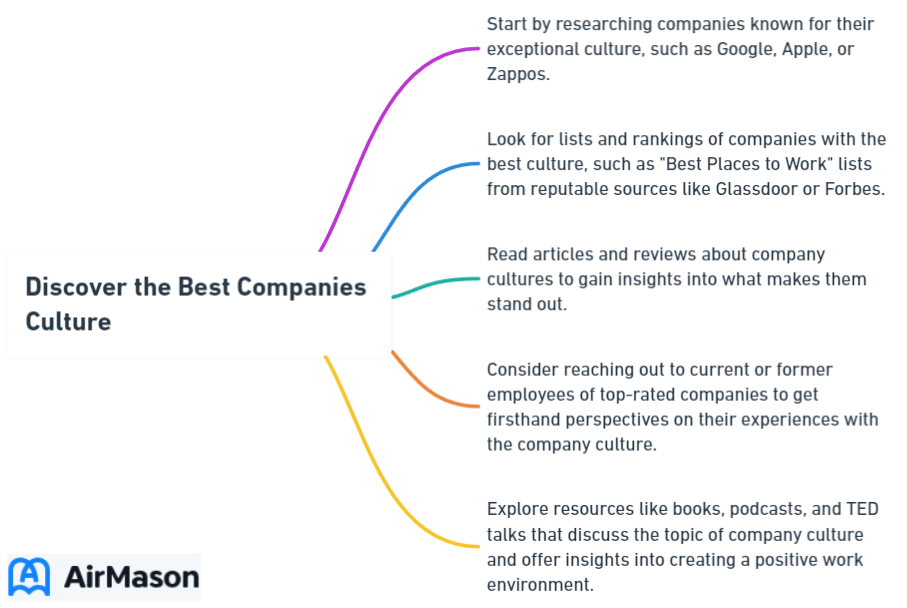
In today’s rapidly evolving business landscape, a strong company culture has become more important than ever. It is the invisible force that shapes employee satisfaction, productivity, and overall success. But what makes a company culture truly exceptional, and how can organizations create an environment that fosters growth, innovation, and employee well-being? In this blog post, we will delve into the best companies culture of 2024, exploring the key elements that define them, the role of leadership in shaping culture, and practical tips for implementing a great company culture.
Key Takeaways
- Discover the best companies culture of 2024, cultivated through fostering equity and community, engaging employees and recognizing their achievements.
- Leadership plays a pivotal role in developing positive company cultures that drive growth and development.
- Companies should prioritize professional development, mental health & wellness initiatives, diversity & inclusion to create an exceptional workplace environment.
Defining Company Culture
Company culture, also known as an organization’s culture, is the lifeblood of an organization. It is the set of shared attitudes, values, beliefs, goals, and other characteristics that define the working environment and drive employee satisfaction. A strong company culture can lead to:
- Enhanced customer service
- Employee engagement
- Employee retention
- Overall business success
In recent years, job seekers have increasingly prioritized company culture when evaluating potential career paths, recognizing the significant role it plays in employee retention.

An Organization’s Culture
An organization’s culture encompasses the shared values, beliefs, and practices that define its identity and shape the behavior of its members. It serves as the foundation upon which the organization’s objectives are built, influencing everything from decision-making processes to employee interactions. A healthy organizational culture fosters a sense of belonging and purpose among its members, aligning their efforts towards common goals. It also plays a crucial role in attracting and retaining talent, as individuals are drawn to environments that resonate with their own values and aspirations. Moreover, an organization’s culture is dynamic, evolving over time in response to internal and external factors. It is imperative for leaders to actively nurture and uphold a positive culture, as it ultimately determines the success and sustainability of the organization in the long run.
Key Elements of Company Culture
Several key elements require an organization’s focus to cultivate a great company culture. These include:
- Equity and community, enabling each team member to reach their full potential
- Engaging and empowering employees
- Fostering innovation, creativity, and productivity within an organization’s culture
- Shared values that guide decision-making and behavior
- A diverse and open work environment that honors and acknowledges employees’ varied backgrounds and experiences
These elements are essential for establishing a great workplace culture.
Mentorship programs and creating a favorable initial impression are effective tools to demonstrate exceptional company culture and help new employees feel connected to their colleagues. Employee recognition, on the other hand, is a means through which the best workplaces showcase their company cultures and support team members.
The Role of Leadership in Shaping Culture
Creating and sustaining a beneficial company culture, which sets the standard, exemplifies conduct, and encourages a supportive atmosphere for career growth, is rooted in effective leadership.
Organizations that strive for excellence invest in leadership development, recognizing employees with leadership potential, and aiding them in acquiring the skills and qualities required to succeed — thereby creating a pipeline of future leaders, including those in the leadership team and remote team.
Top 10 Companies with Exceptional Culture in 2024

Presenting the top 10 companies with the best exceptional culture in 2024, demonstrating their unique approaches and best practices. These companies have prioritized:
- Professional development opportunities
- Flexible work support
- Mental health and wellness
- Leadership development
- Diversity and inclusion
These efforts have resulted in outstanding company cultures that attract and retain top talent.
Company 1
Company 1’s culture is the epitome of innovation, collaboration, and employee well-being, which has led to one of the best company cultures and a highly productive work atmosphere. They offer comprehensive benefits designed to support employee learning and development, mental health, and time off, enabling employees to bring their best selves to work.
Company 1’s thriving environment, attracting and retaining top talent, stems from a focus on these key aspects.
Company 2
Company 2 has built a highly engaged and motivated workforce by:
- Placing a strong emphasis on diversity and inclusion
- Actively seeking out job applicants from underrepresented groups
- Implementing initiatives to ensure all employees have equal opportunities for career advancement
Additionally, Company 2 provides a variety of learning and development initiatives, including job rotation programs, tuition and licensing reimbursement, and access to job-related conferences and seminars.
Company 3
At Company 3, transparency, open communication, and employee empowerment form the foundation of their culture. Their environment of trust and loyalty is nurtured by regular communication and updates regarding changes, honest and constructive feedback, and a promotion of open dialogue among employees and management. This culture has resulted in increased employee engagement and a sense of ownership over the company’s goals and success.
Company 4
Company 4 has excelled in creating a culture that values work-life balance, flexibility, and employee development. They strive to foster work-life balance by:
- Emphasizing productivity over hours worked
- Equipping workers with attention management skills
- Providing flexible working schedules
- Enabling remote work
- Granting access to exercise
- Setting meeting-free periods
- Promoting perks that promote balance
- Encouraging vacation time
This approach has led to high levels of job satisfaction and retention among Company 4 employees.
Company 5
Company 5’s culture is centered around social responsibility, sustainability, and community involvement, inspiring employees to make a positive impact on the world. They have implemented CSR programs to benefit both society and their employees, prioritized fair treatment across all customers, and maintained a healthy and inclusive workplace culture.
Focusing on these aspects has allowed Company 5 to cultivate a culture that sets them apart and draws top talent.
Company 6
Creativity, innovation, and a growth mindset are the hallmarks of Company 6’s culture. They implement multiple strategies to foster creativity and innovation within their teams, including encouraging brainstorming sessions, cultivating open communication, and promoting a stimulating and inclusive work environment. Company 6’s environment, where employees are empowered to generate new ideas and solutions, driving the company’s success and industry leadership, is shaped by nurturing these values.
Company 7
Company 7 has successfully created a culture that fosters teamwork, collaboration, and a sense of belonging, leading to an effective and unified workforce. They promote teamwork and collaboration by incorporating it into their mission statement, offering necessary resources, and promoting open communication.
Additionally, they work to cultivate a strong sense of belonging among their employees by avoiding favoritism among leaders, involving employees in business decisions, and maintaining open communication and transparency.
Company 8
Company 8 has built a culture that values employee feedback, continuous improvement, and a customer-centric approach, leading to exceptional service and business performance. They employ techniques such as annual or quarterly employee engagement surveys, pulse surveys, team and one-on-one meetings, and stay interviews to collect and leverage employee feedback. Prioritizing the customer and listening to their employees has enabled Company 8 to create a culture that drives success.
Company 9
Company 9’s culture prioritizes employee wellness, mental health, and a supportive work environment, contributing to a happy and healthy workforce. They provide remote flexibility and flexible working hours to ensure the emotional and mental well-being of their employees. In addition, they have implemented various initiatives and programs to support a healthy workforce, such as on-site fitness centers, smoking cessation programs, transit options, and more.
This focus on employee wellness has led to increased job satisfaction, work-life balance, and overall well-being for Company 9 employees, thanks to the emphasis on perks and benefits.
Company 10

Company 10’s culture encourages adaptability, resilience, and a solutions-oriented mindset, enabling the company to thrive in a rapidly changing business landscape. They emphasize a growth mindset and curiosity, advocate risk-taking, facilitate effective communication, and cultivate a safe environment for their employees. Fostering these values has enabled Company 10 to build a culture that allows them to successfully navigate the challenges of the modern business world and remain competitive.
How to Implement a Great Company Culture

Creating a great company culture requires a deliberate and thoughtful approach, taking into account the unique needs and goals of an organization. Building a positive culture that drives employee satisfaction, productivity, and overall business success involves:
- Aligning values and vision
- Fostering open communication
- Investing in employee development
- Promoting work-life balance
- Embracing diversity and inclusion
Aligning Values and Vision
Guiding company culture and ensuring alignment across the organization heavily depends on establishing clear values and a shared vision. Company leaders should articulate the company’s mission and vision, adopt a servant leadership approach, and lead by example.
Encouraging employees at all levels to provide input and feedback is also essential for fostering a sense of ownership and dedication to the company’s values and vision.
Fostering Open Communication
Fostering trust, encouraging collaboration, and inspiring employee engagement, all crucial for building a healthy company culture, are deeply rooted in open communication. Leaders should share relevant company information, be open to employee questions and feedback, and establish a culture of transparency to promote open communication.
By cultivating an environment where employees feel comfortable voicing their opinions and concerns, organizations can create a strong foundation for a thriving company culture.
Investing in Employee Development
Creating a positive company culture and driving overall business success is contingent on investing in employee development. By providing employees with the necessary resources and opportunities to build their skills and knowledge, companies can:
- Increase job satisfaction, engagement, loyalty, and retention
- Achieve higher productivity and performance
- Attract top talent
- Have a positive effect on the organization’s bottom line.
Promoting Work-Life Balance
Creating a positive company culture and increasing employee well-being, productivity, and loyalty is associated with promoting work-life balance. Companies should:
- Emphasize productivity over hours worked
- Equip employees with attention management skills
- Provide flexible working schedules
- Enable remote work
- Encourage vacation time
By focusing on these key aspects, organizations can create a culture that supports and nurtures employees both personally and professionally.
Embracing Diversity and Inclusion

Fostering a diverse and inclusive work environment can enhance company culture, drive innovation, and improve overall business performance. Companies should make a deliberate effort to recruit talent from a variety of backgrounds and actively seek diverse candidates through specific channels.
In addition, creating an inclusive culture will make employees feel more comfortable, connected, and engaged in the workplace.
Open Culture: Fostering Collaboration and Innovation
Open culture is a fundamental cornerstone of progressive organizations, emphasizing transparency, inclusivity, and accessibility in all aspects of their operations. This approach cultivates an environment where ideas flow freely, enabling employees to contribute without fear of hierarchy or judgment. In an open culture, information is shared openly, ensuring that every team member is empowered with the knowledge they need to make informed decisions. This ethos not only encourages collaboration but also sparks innovation, as diverse perspectives converge to create novel solutions. Through open culture, organizations break down silos and promote a sense of belonging, ultimately driving a more cohesive and dynamic work environment that adapts seamlessly to change. Embracing an open culture is not merely a trend; it’s a strategic imperative for organizations aiming to thrive in today’s rapidly evolving business landscape.
Case Studies: Companies That Transformed Their Culture
Three case studies of companies from around the world that have successfully transformed their culture, along with the challenges they faced, the strategies they implemented, and the positive outcomes they achieved, are presented below.
These case studies provide valuable insights and lessons for organizations looking to improve their own company culture.
Company A
Company A faced numerous challenges in its pre-transformation culture, including resistance to change, inadequate communication, and adherence to implicit conventions. Company A turned around its toxic culture and created a positive working environment by prioritizing employee well-being, open communication, and a renewed focus on company values.
This transformation has not only improved employee engagement and satisfaction but also contributed to the overall success of the company.
Company B
Company B transformed its culture by:
- Embracing diversity and inclusion
- Fostering a sense of belonging
- Investing in employee development
- Actively seeking out diverse talent
- Implementing initiatives to ensure all employees had equal opportunities for career advancement.
Company B has created a highly engaged and motivated workforce that drives their ongoing success by prioritizing employee well-being, fostering strong team relationships, and enabling open communication.
Company C
Company C revitalized its culture by promoting innovation, collaboration, and a growth mindset, leading to increased employee engagement and business success. They implemented multiple strategies to improve company culture, fostering creativity and innovation within their teams, including encouraging brainstorming sessions, cultivating open communication, and promoting a stimulating and inclusive work environment.
Company C, one of the large companies, has built a culture that allows them to successfully navigate the challenges of the modern business world and remain competitive by nurturing their company’s core values, which are in line with the company’s values.
Workplace Culture Defined
Workplace culture defined refers to the unique blend of values, beliefs, behaviors, and practices that shape the environment within an organization. It encompasses the shared attitudes and norms that guide interactions among employees and with the organization itself. A strong workplace culture is characterized by a sense of belonging, open communication, and mutual respect. It sets the tone for how individuals collaborate, make decisions, and approach their work. Moreover, a well-defined workplace culture can have a profound impact on employee satisfaction, productivity, and retention. When clearly articulated and consistently upheld, it becomes a powerful force that not only defines the organization, but also attracts like-minded individuals who align with its ethos.
Summary
In conclusion, a strong company culture is the key to unlocking employee satisfaction, productivity, and overall business success. By focusing on key elements such as trust, communication, shared values, and employee engagement, organizations can create a positive work environment that fosters growth and innovation. By learning from the top 10 companies with exceptional culture in 2024 and implementing practical strategies for improvement, businesses can transform their culture and achieve lasting success.
Frequently Asked Questions
What company has the best culture?
Microsoft has been hailed as having the best company culture for two consecutive years, followed by Chegg, Hubspot and RingCentral, who all have also made it to the list for the past three years.
What is an excellent company culture?
An excellent company culture encourages mutual respect, open communication, and a commitment to shared goals and employee development. It brings the values of the organization to life on a day-to-day basis and creates an environment of support and appreciation.
What are the 4 C’s of company culture?
The four C’s of company culture are competence, commitment, contribution and character. These help align organizational and individual goals to make an organization successful, fostering cooperation, collaboration, and connection with employees and customers.
What are the key elements of a strong company culture?
Strong company culture is built upon trust, open communication, shared values, and employee engagement.
How does leadership play a role in shaping company culture?
Leadership plays a key role in developing and sustaining company culture by setting the standard, exemplifying appropriate behavior, and creating an environment that encourages professional growth.